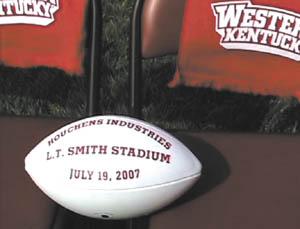Growing stadium gets new name
Published 12:00 am Thursday, July 19, 2007

- Photo by Joe Imel/Daily NewsCommemorative footballs were presented to Houchens today in honor of the corporation's $5 million donation to WKU Athletics.
Western Kentucky University’s football stadium now bears a new name – Houchens Industries-L.T. Smith Stadium.
Houchens Industries, a longtime supporter of the university, made a $5 million commitment – the fourth largest cash gift in WKU history – to enhance an expansion and renovation project for the university’s football stadium. In response to the gift, the university announced the addition of the company’s name to the stadium’s official moniker today during a press conference at the university.
Trending
 – Click here for Daily News video of the press conference.
– Click here for Daily News video of the press conference.
“A total sports package is important. It’s the face of the this university,” said Jimmie Gipson, chairman and CEO of Houchens Industries. “This is what it took to get over the hump to get this project completed. And it’s more exciting because students will be able to associate with this name.
“It gives a little hometown flavor for them.”
WKU President Gary Ransdell said the $5 million has been received and in the bank – paid in full June 30.
“This is a cash gift, which is really exciting,” said Tom Hiles, vice president of Institutional Advancement. “It lets us take this program to another level. The renovation is great, but now it’s special.”
The one-sided stadium, which currently seats 17,000, is undergoing a $37.5 million renovation that involves the construction of new seating on the west side. The renovation will provide 5,000 new seats, along with concessions stands and restrooms, and will also house football offices and locker rooms, a weight room and a training room.
Trending
“We are increasing seating to close to 25,000 with a $1.5 million replay board attached to the scoreboard, which is 90 feet high, and a redeveloped south endzone,” Athletics Director Wood Selig said.
The gift allows the university greater financial capacity to complete the renovation and expansion of the football stadium in a first-class manner, he said.
“We always say that high school recruits buy with their eyes, and when they see the shiny new stadium, it makes a statement,” he said. “It’s a statement about a commitment to quality and a statement about a commitment of success, and a statement to current and future fans for spectator-enhanced quality.”
Selig hopes the gift will allow the university to add other features that will help for decades to come, including recruitment on a higher national profile and an expanded footprint of support for WKU football.
The university broke ground on the renovation project last December.
“But figuratively, we are breaking ground on a new era for WKU Athletics and private philanthropic support,” he said. “And Houchens Industries is certainly modeling the way for future corporate and individual philanthropic support.
“When one thinks of the collegiate programs, one thing that is shared is their ability to generate private support for their programs. This gift kind of moves us into a faster lane.”
Houchens Industries is the country’s largest employee-owned company and one of the largest employers in Bowling Green, boasting some 11,000 employees. It’s been a financial contributor to the university for many years, Ransdell said.
When the university came short of finishing Diddle Arena’s renovation five years ago, Selig said, Houchens stepped in.
“Houchens named the floor in Diddle Arena, and created additional financial capacity to complete the Diddle Arena renovation project,” Selig said. “So they’ve had a history of stepping up and helping us try to accomplish our lofty athletic goals.”
Houchens has also committed to supporting the basketball program, giving $1.5 million each year in support.
“We cannot do it ourselves,” Ransdell said.
The stadium was originally named after L.T. Smith in October 1968. Smith joined WKU in 1920 to organize the Department of Industrial Arts, developed the first industrial arts teacher education program in the state, and was known as the dean of industrial arts education. He coached football in 1920 and 1921 and basketball from 1921-22. He helped form the faculty athletic committee in 1922 and served as chair almost continually until his retirement in 1965.
The actual playing field, meanwhile, bears the name of former coach Jimmy Feix, who held various positions within the athletics program.
Ransdell said by forming the partnership, the university is selling the “brands” of both Houchens and WKU. There are many examples of multiple names on stadiums, he said, referencing Papa John’s Cardinal Stadium at the University of Louisville. That stadium cost $63 million to build, with Papa John’s Pizza founder John Schnatter donating $5 million for the naming rights.
Gipson said Houchens is “extremely” glad to support WKU.
“People take notice, and this is a challenge for others to support at a leadership level,” Hiles said. “People want to give a gift of impact. Often the impact is not seen with endowments, but the impact of this will be able to be seen fairly quickly.”






